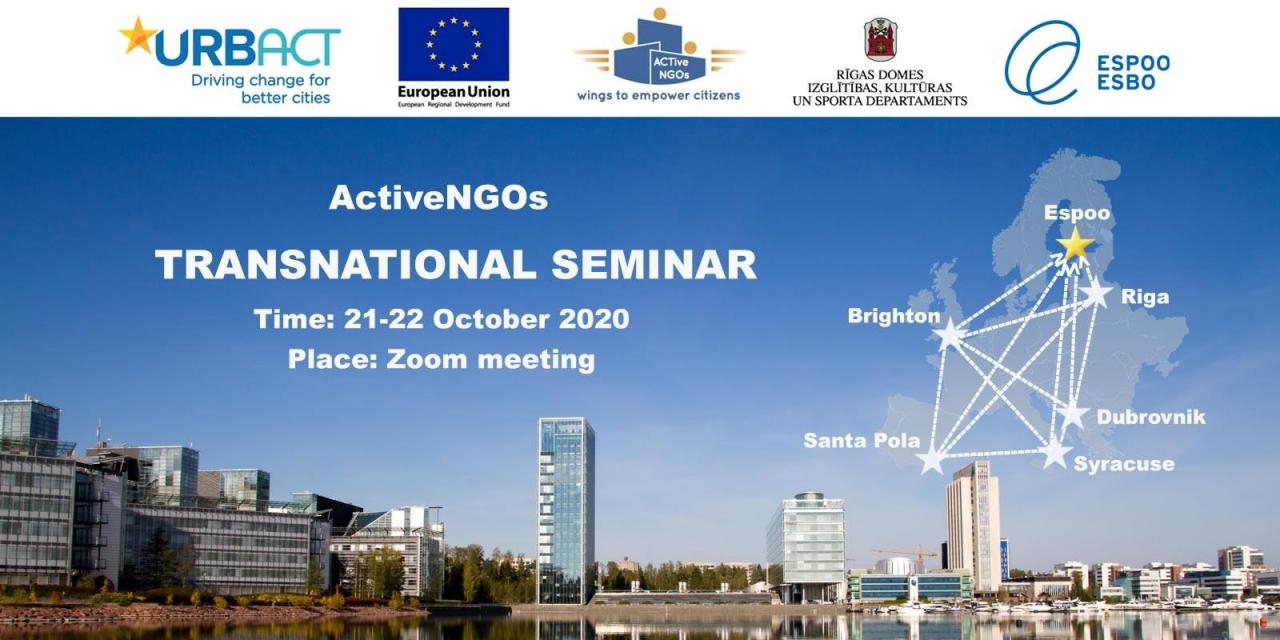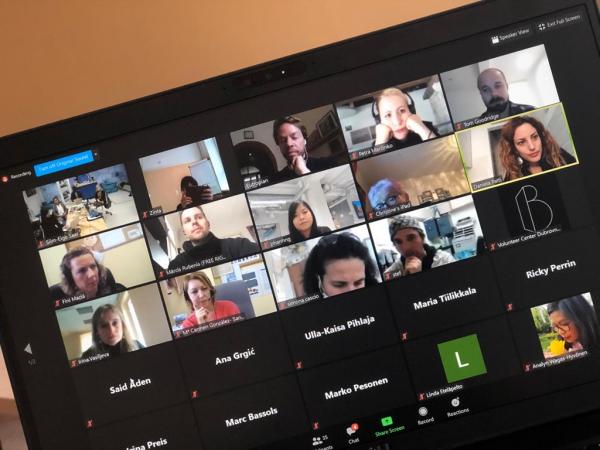
The partners of the project “Riga NGO House - Platform for Cooperation between Non-Governmental Organizations and Municipalities” (ACTive NGOs) met this time in a virtual environment and shared their experience during the international seminar. The fourth seminar of the project was dedicated to getting to know more about the situation in the Finnish partner city of Espoo.
On 21st and 22nd of October 2020 a fruitful work during the seminar “Capacity building, professionalisation & active procurement” took place, bringing together all project partners, URBACT local support groups’ representatives and other stakeholders.
During the seminar special attention was paid to various ways of building and strengthening the capacity of NGOs in order to transform organizations from volunteer clusters into professional teams. An important aspect in this process is also well-organized and socially responsible procurement, in which non-governmental organizations can start as service providers.
The event was opened by Tuula Antola, Director of Economic and Business Development in Espoo Municipality. "The population of Espoo is 290 000, the city has about 3,000 non-governmental organizations that play an important role in the life of the city, offering public services - openly, fairly, respecting the principles of equality, humanity and tolerance. Participation in ACTive NGOs helps Espoo and other partner cities to analyse the local situation in depth and to develop active civic participation,” emphasized T. Antola in her address:
During the expert-led session, Levente Polyak, lead expert of ACTive NGOs, and Daniela Patti, ad-hoc expert, highlighted the relevance of the topic of the seminar for both partner cities and municipalities in Europe, as well both experts provided some successful examples. If the municipality aims to strengthen the city's civic ecosystem and rely on the skills, knowledge and capabilities of NGOs, it should develop various capacity-building activities to improve public awareness, communication capacity, governance capacity or the economic sustainability of civil society. In many cases, this capacity building is linked to ambitions and a desire to help NGOs, social enterprises and other civic actors to move from volunteering to professional services. In order for NGOs to be able to respond to the needs of society and provide public services, municipalities also need to develop socially responsible procurement or contracting principles that help redirect public spending towards activities that create jobs or other positive social impacts.
During the ULG session, participants had the opportunity to go on three virtual tours, exploring the public, community and NGO spaces in Espoo.
The first trip led to Omnia MakerSpace, a collaborative and technology-rich environment that brings together the local AGrid startup community and students. Ideas are based on breaking boundaries, trying something new, learning new things or coming up with new ideas.
The second virtual insight was into the work of the EJY, a civic center that has been in operation for 15 years and was set up at the request of organizations to be a place to work, be together, organize events and manage internal administrative affairs.work, be together, organize events and manage internal administrative affairs.
The third virtual tour led to the Iso Omena library, which is a new public service concept. This center has been established with the aim of facilitating the daily use of services by the residents of the municipality. The community center includes a library, maternity and child health clinic, health center, citizen service office, meeting rooms, art and cultural events, and more.
Representatives of ULGs from each partner city shared their stories, experiences, activities and problems.
The first day ended with a special - sauna session, where participants could learn about Finnish sauna traditions, as well as get to know the features and characteristics of the Finnish people.
In the introduction to the second day of the seminar, URBACT expert Christian Iaione described the meaning of public procurement with a social impact and presented examples of good practice and guidelines for procurement in different European cities.
Next, the project participants had the opportunity to go on virtual tours, getting to know 3 public centers in Espoo.
Community House Kylämaja is a multifunctional association that provides social services, supports civic and voluntary activities. Its operation is based on the values of society.
Me-talo is a meeting place for Espoo residents, representatives of associations and NGOs. Activities in Espoo City are coordinated by Nicehearts. Me-talo aims to improve the well-being of people as equal members of society.
Trapesa is an international meeting place with the aim of promoting tolerance and equality between different cultures with the slogan "share and connect". Trapesa offers a neutral and objective environment for discussion, hobbies and learning for all people, regardless of their nationality or religion.
The next session was dedicated to the situation and problems in Espoo, especially in the search for solutions for the model “NGO House as a concept of cooperation” proposed by Espoo. Participants also looked for answers to the question on how can NGOs and the municipality work together to improve the economic sustainability of NGOs. The Espoo team was also interested in diccovering how to effectively divide the space between the participants to ensure diverse civic activities, if the space is owned by private or municipal companies.
Towards the end, the participants had the opportunity to get acquainted with various digital tools and work with NGOs, such as “Tinder for NGOs” - an opportunity for NGOs to get acquainted in a digital environment or a virtual café, or an Espoo virtual service map.
Levente Polyak, in his turn, presented the content of the book planned within the project, the planned chapters and articles in them, inviting to make suggestions for supplementing the content.
The second day of the international seminar ended with a meeting of the project steering group, where the partners looked back at their achievements, discussed the progress of the project and the timeline for future activities.
Thank you, wonderful Espoo team for your hard work and hospitality!


